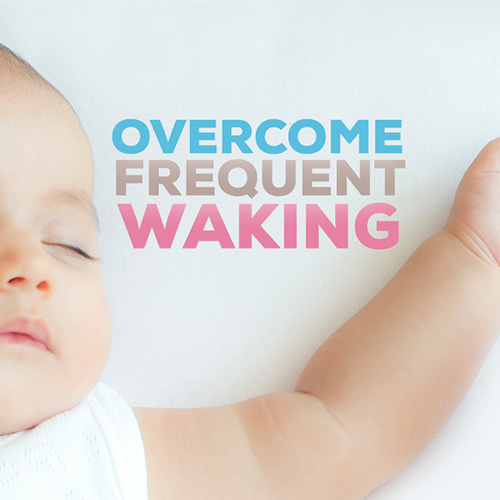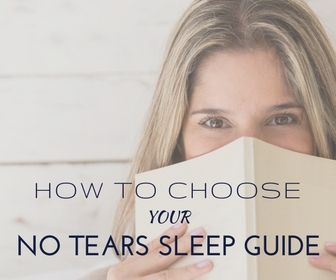10 month baby wakes 7-10 times a night. Help.
by Cathy (San Diego)
Question: My ten month old baby wakes up every hour or so.
She was actually getting better the last few months only waking 2-5 times (and short awake time only, she would fall back asleep quickly). However, the last month she wakes every hour, and then takes about 30 mins to get back to sleep.
She cannot find a position to sleep that suits her (even nursing doesn't work) and she refuses my husband's help. She cries within 30 secs or so if no one goes in and she is staning and crying within 1 min (not hysterical but upset).
I do not believe in the Ferber Method, but I am at wit's end and I work FT. She is not sick and not currently teething and nothing unusual going on in the house. I am beside myself and do not know what to do. Please help.
Update: Heidi's Overcome Frequent Waking program is exactly right for solving this because the plan is doable, the techniques work, and it's true there's no crying it out 💛
Heidi's Answer:
Dear Cathy, thank you for sharing your question. I know this is tough, especially since it has been better the last few months.
A baby sleep regression always feels extra hard after a few weeks or months of better sleep. But the good thing is, having had that better it also makes it easier to get back on track. So let's see how to make things better again!
You won't need to resort to Ferber or any form of sleep training method that involves your baby crying.
I'll briefly talk you through the 10 month sleep regression first. Next we'll talk about how baby separation anxiety, a completely normal developmental milestone around this age, is likely at play and how to tackle it.
We'll look into dad's role and the bedtime routine. And then help your baby learn to fall asleep independently and stay asleep for longer. All without crying.
To get started with ease and stay on track, you might prefer my Overcome Frequent Waking program because it's a tailored action plan, includes full detailed steps for each technique, and comes with direct support by me for any questions along the way.
The 9-month, 10-month, 11-month sleep regression
Most sleep regressions are linked with developmental milestones and often combine with a growth spurt. Babies develop in their own individual way. We know 'around' which ages typically to expect big changes, and this 9-10-11 month range is one of those ages.
It's when your baby becomes more conscious of how the world around them functions (what fits where and in which order). Most babies at this age have a renewed and often increased need for your presence and reassurance. Hence the phase of increased anxiety, and often single-handedness, when you're not around.
Like every big developmental step, also this one comes with its sleep regression: baby's brain, body and emotions are maturing and going through a lot of changes. This alone simply makes it harder for most babies to sleep their best during sleep regressions.
What to do about your 10 month old waking every hour?
Help your baby sleep through with these 4 action steps:
Tackle separation anxiety
Review your baby's sleep schedule and bedtime routine
Practice staying asleep for longer stetches
Practice falling asleep independently
Overcome Frequent Waking
Access the award-winning program by Heidi Holvoet, PhD. Truly-no-tears, proven effective techniques with easy, tailored action plan.
"We went from waking every 1-2 hours to self-settling and sleeping 8hr stretches - thank you Heidi!" - Suzana P.
Action Step 1. Tackle separation anxiety

Your little girl's sleep problems are likely linked with separation anxiety. She's at a typical age for a phase where she fears not to see you again. Her refusal of your husband's help may be a sign of it too - and as we'll see, them spending more time together will help.
So with separation anxiety playing, when she wakes up at night (at the end of a sleep cycle), instead of going straight back to sleep as she had so nicely learnt, she realizes you are not there.
And that triggers her fear, making it of course difficult to go back to sleep. Her crying and being upset quickly also point to this.
Please do check the baby separation anxiety article. See if you recognize some symptom(s), especially the ones during the day, but also at night. And use the tips I share to get you both through this phase.
Also download my free Play2Sleep games. The Yo-Yo game in particular is a confidence booster and perfect to help tackle this 10 month sleep regression.
It's fun and easy to play, and super powerful to make this separation anxiety phase a positive developmental milestone. One that's not about fear and uncertainty, but builds a strong bond and foundation for self-confidence and independence.
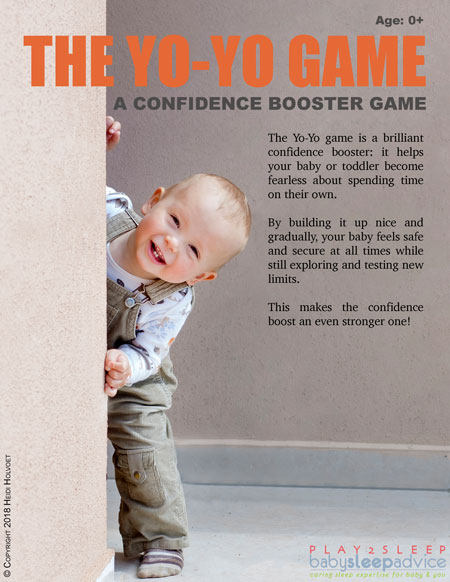
What your baby girl needs most of all in this phase is your reassurance and presence. That does not mean you have to sit and hold her constantly. But be there while confidently encouraging her independence.
Consider a night light if you haven't already. For many older babies, to help with the anxiety, it becomes more important to have a low, soft, reassuring light at night.
For sleeping during this sleep regression, it will be of no use to have her crying and become even more upset. So if she wakes up and cries, it's best to go to her. (We'll see in action step 3 and 4 how to pre-empt waking at all).
Reassure and then put her down, helping her to fall asleep in exactly the same way as when she first goes down in the beginning of the night.
To keep the waking as short and uninteresting as possible: stay in her room, do not use any extra light, interact as little as possible, etc.
Action Step 2. Review your baby's sleep schedule, bedtime routine and involve dad
Sleep schedule
During a sleep regression is also a good time to re-evaluate your girl's day and night sleep schedule (in this article you'll find schedules by baby's age). She probably has one nap time or two naps a day.
Make these regular, one mid-morning and one mid-afternoon. If possible, shift her night time bedtime a bit too. We're looking to avoid both over- and under-tiredness.
If she goes quite late (8pm or later), shift it to earlier, to 7 or even 6.30pm. Even if this sounds a bit counter-intuitieve, a one hour earlier bedtime helps many babies sleep through the night. That's becomes it helps balance sleep over the 24 hour period.

Especially if they have relatively late bed times leaving them over-tired. If your baby already goes to bed early (such as 6pm), then consider shifting to half an hour later in stead. Give each test at least a week before trying something else.
Your main guide should be how your baby girl feels and behaves. If she's overtired, it can either show itself in crankiness and crying or can come as seemingly have lots of energy and being super (overly) bouncy. Under-tiredness can be easier to spot though you do have to look for it.
Your under-tired baby will not only have trouble falling asleep but will be happy and content right up til the moment you do anything 'towards' sleeping. She'll recognize that and become upset and possible start crying even before you attempt to help her fall asleep.
A consistent bedtime routine
You likely already have a routine before bed. So just as a reminder to have a good, simple and recognizable always-the-same one set up. Usually this routine starts right after, or right before, the last feeding before the night. Whenever a sleep regression plays up, reviewing these foundational essentials of baby sleep hygiene are super helpful.
In particular to help with the waking every hour, a good wind-down period is extra important. This is when you lower all lights and activity in the hour before bed. So that starts even before the routine.
Winding down helps baby's nervous system quiet down and this is incredibly important to prepare for a night with deep restful sleep.
Involve dad
Can you think of a reason why your baby girl refuses your husband's help? What often happens is that daddies, because of work and other reasons, find themselves spending less time with baby than moms.
As a consequence, baby is less used to being soothed by dad. And that makes it more difficult when he's trying to help out at night.
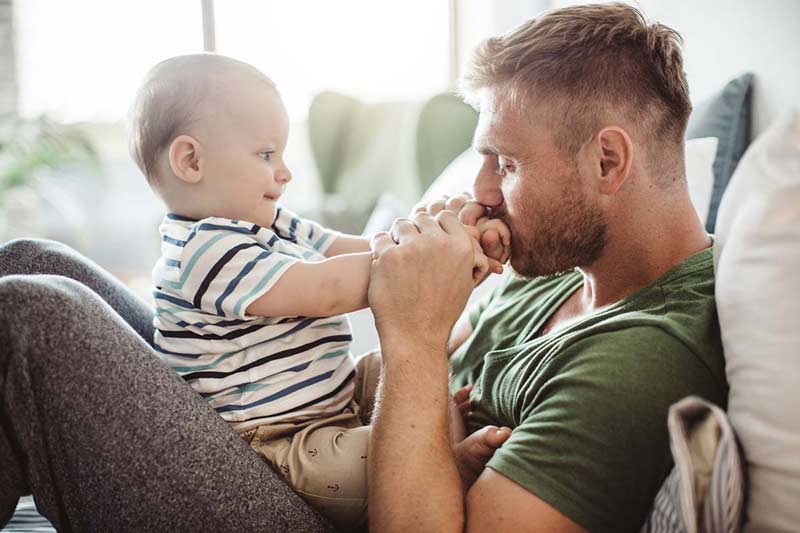
This may or may not be your case, but if it is, the first thing to do is for your husband to spend as much time with her together during the day, whenever he can. If possible without you around.
Every daytime moment spent together during the day will help twofold towards the nights. Especially when they also get to do fun stuff together. No pressure, just spend time doing completely normal things.
Also good for him to realize that he's not doing anything wrong. It's just a typical phase for many babies, especially through sleep regressions. As long as he stays involved at other times of the day, and helps practice the below, he will be back to being able to help.
Did you know I have a dedicated Dad & Baby Sleep Training? It's a free 3-days 3-emails training that many dads tell me they find very helpful.
Action Step 3. Practice staying asleep for longer stetches
Now to avoid her waking up each hour, this is a technique you can apply, step b step:
Go to baby's room about 50 minutes after she went down, or 5-10 minutes before she'll typically wake, so when she's still asleep. Be very quiet so as not to wake her.
Place your hands on her tummy, stroke her forehead, place your hands on both shoulders, ... whichever you know will work best to comfort her.
The idea is that your presence will help her go straight back to sleep in stead of waking fully. So you'll want to stay for about 10-15 minutes.
Watch her closely, you will probably see her half-wake up (stay calm and do not interact), move and squirm a bit, maybe even cry a little. And then she'll doze off again.
This may not work from the very first time. Then soothe her and put her back down as usual. Then try again a next time. With patience, this can be very efficient to help her sleep more restfully again.
Of course, this could be quite intense for you to be up in time to catch her before she wakes. But you don't need to do it for every waking.
Do it once or twice a night, for a few nights in a row, at times that feel possible for you. See how this goes after a few nights and how much sleep you're gaining.
Action Step 4. Practice falling asleep independently
As a next step, to further improve nighttime sleep, start practicing self-soothing to sleep. Again, no need to sleep train, no need for harsh sleep training methods that involve crying.
My no-tears self soothing techniques progressively help your baby sleep more and more independently.
That means she falls asleep on her own at the start of the nap or night, and we gradually optimize her sleep patterns so that it also becomes easier to go back to sleep soundly after some awake time.
Wrapping up
A few wrapping-up thoughts that may be at play during this sleep regression:
Even if she's not teething visibly, it may be worth checking some of the hidden signs of teething. Teething pain can occur even before any signs of teeth cutting through are visible.
In part it can be teething pain itself that's causing trouble sleeping. And in part, it's often increased hunger because feeding can feel uncomfortable because of sore gums.
And finally, you mention she does not seem to find a comfortable position. Could it be that lying down flat makes her uncomfortable? Does she also cry when lying down during the day? Then it may be worth having her checked by a physiotherapist or a certified pediatric osteopath.
Help your baby sleep through consistently
Waking every hour at night at this age usually is a combination of underlying triggers as well as a need to learn and go (back) to sleeping more independently.
We work on both of these effectively inside my award-winning Overcome Frequent Waking program. Inside it, I guide you with a tailored sleep action plan and my truly-no-tears baby sleep techniques.
No harsh sleep training nor any form of crying is involved. Just truly effective, progressive techniques kept doable and realistic for both you and your baby with my tailored action plan.
And you don’t have to do it on your own: with this program, you have access to ask me questions on my private support group: I’m active on it every day and so are members of the team.
For now I wish you all the best of luck, warmly, Heidi
Article Author: Heidi Holvoet, PhD - Founder, senior sleep consultant

Heidi Holvoet, PhD, is the founder of the Baby Sleep Advice website and movement, an award-winning author, baby & toddler sleep consultant with 17+ years experience as well as a certified lactation counselor.
Over the years, Heidi has received several awards inluding a Mom's Choice Award (MCA) and National Parenting Awards (NAPPA) for her Baby Sleep Advice website, programs and books. Also, Baby Sleep Advice was awarded "Most Trusted Infant's Sleep Solutions Company 2023" in the Benelux Enterprise Awards 2023.
Heidi continually conducts personal research and participates in continued education and in that way stays up to date with current scientific and pyschosocial infant care.
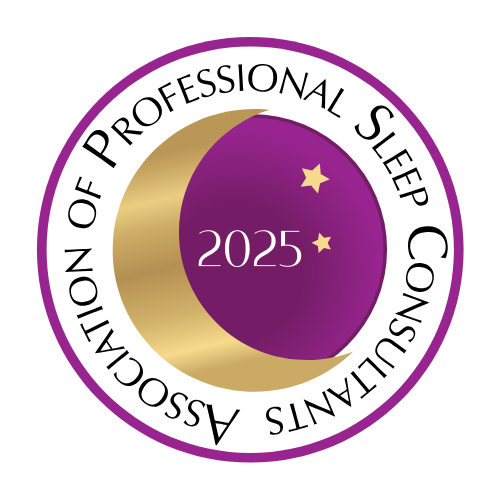
She is also a member of the Association of Professional Sleep Consultants of which she was one of the earliest contributors. She obtained her PhD degree in physics at the University of Ghent in Belgium.
Heidi is passionate about helping babies and their parents sleep more and better, with her trademark holistic and truly-no-tears approach that has been proven and praised time and again by parents worldwide to be effective and truly no-tears. Respect for you as a parent and your baby, is at the heart of Heidi's warm and kind support. Her approach always keeps in mind a baby's needs and abilities at any given age, is based on pediatric science and the most up to date knowledge in infant care and sleep science.
As well as the award-winning baby sleep programs, Heidi offers popular 1:1 consults and easy-access 30-minute SOS Sleep sessions.
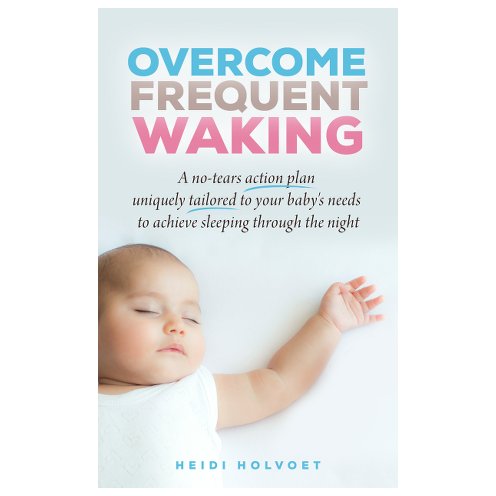
Overcome Frequent Waking: e-book + support
by Heidi Holvoet, PhD

A Bedtime Routine: Settling To Sleep Like A Charm
by Heidi Holvoet, PhD

Crib safety guidelines
by Heidi Holvoet, PhD

Acid reflux
by Heidi Holvoet, PhD

Why is sleep important?
by Heidi Holvoet, PhD

